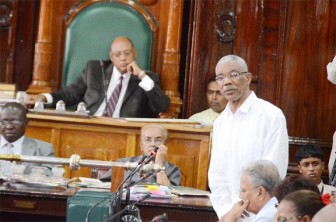While labelling this year’s national budget as one that is “badly out-of-touch” with the needs and conditions of Guyanese, Opposition Leader David Granger yesterday stated that the main opposition APNU will not be supporting it in its present form.
“The PPP/C’s proposed budget will be measured in its public impact. It must be amended if the people are to see real change in their lives. There is no way the country can move forward with such a budget that so recklessly disregards the most important factor in national development—the people,” Granger told the National Assembly during his contribution to the budget debate. “We, therefore, cannot support the budget in its present form and we recommend amendments,” he said.
According to Granger, the budget presented by Finance Minister Dr Ashni Singh marked the end of an era, as it is likely that the National Assembly will commit to introducing an inclusionary budgetary process by establishing its own multi-party budget office. “It might well have been the last occasion on which any single party, particularly one that is a parliamentary minority, could come before this honourable house pretending that it alone had all the answers to the questions of national development or all the solutions to the problems of national unity,” Granger said. “It must surely be the last time that a minority administration must presume to ignore the public will by attempting to exclude the majority side from contributing to the preparation of the budget,” he added.

“The budget’s big weakness is that it is badly out-of touch with the reality of the actual needs of the people and the conditions in the country,” Granger argued. “It did not even try to encourage the people themselves—through alleviating poverty, reducing the burdensome cost-of-living, increasing jobs, improving education and enhancing human safety—to participate in the plan,” he added.
Identifying five failures of the $192.8 billion budget, Granger said that the government’s financial plan failed to introduce meaningful measures to reduce poverty and the cost-of-living of the majority of Guyanese as well as reduce the Value-added Tax (VAT). He also lambasted the government for failing to increase the salaries of nurses, teachers and other public servants or meaningfully increasing the old age pensions. He cited the absence of sufficient job opportunities as another failure, in addition to the inadequate funding for the University of Guyana (UG) and the Cyril Potter College of Education (CPCE).
The budget, Granger said, failed to provide adequate funding to enable the Police Force to counter crime. The lack of adequate funding to upgrade hinterland regional administrative centres—especially Bartica, Lethem, Mabaruma and Mahdia to township status—was also dubbed a failure.
“The budget, despite its promise—prosperity for all— is more likely to perpetuate poverty for many. Its main proposals are based on the wrong precepts, wrong preferences, wrong priorities and wrong policies,” he said. “Left uncorrected, it will have hugely disappointing, even damaging, consequences for the nation-at-large,” he warned.
Speaking about the needs of Guyanese, Granger said it would be a grave error for the National Assembly to think that attention to the country’s social problems could be postponed to another year. “The budget promises to dole out billions to ailing state enterprises but was stingy in its treatment of the very persons needed to turn the economy around,” he said, adding that the budget does not signal any relief or substantial new resources that would be directed to those who need them most.
Identifying five needs of Guyanese, Granger said that every child must have access to excellent primary and secondary education, including access to books, meals, transportation and uniforms. Safety was also identified as a need. ”The budget ignored the need to protect our fishermen, miners and other working people by failing to provide funds to equip the Police Force with the aviation, maritime and land transport assets it needs to curb piracy in our coastal waters and banditry in the hinterland,” he said.
The Opposition Leader also spoke about the need for university and high school graduates to have access to jobs after they would have completed their studies. The budget, he said, did not indicate how jobs would be found for the thousands of young school-leavers who enter the labour market each year.
“There must be equality of opportunity if youths are to have a chance to enjoy a good life,” Granger said, adding that the quality of life for all must also be raised.
Meanwhile, Granger said that Guyanese were looking to experience certain freedoms in their country, including freedom from fear, discrimination, want and the scourge of ignorance and illiteracy.
“There must be freedom from discrimination. All individuals must be treated as equals. All regions, communities and ethnic groups must be treated equitably,” Granger declared. Calling for “freedom from the scourge of ignorance and illiteracy,” he pointed “to the primary and secondary discharge of nearly one semi-education, semi-literate dropout every hour of every day of the year.”
Further, he said that there must be freedom to communicate and to receive ideas and information, while declaring that Guyanese “must never again be prevented from listening to the radio of their choice.” “Lindeners must never again be prevented from viewing television programmes of their choice,” Granger noted, clearly referring to the state monopoly on the airwaves in the town. “Citizens must not have to pay for the daily pap that comes forth from the government’s information agencies,” he added.




